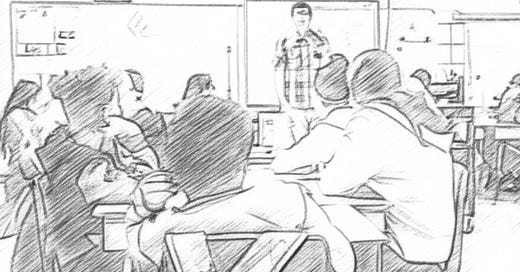Rediscovering Education's Purpose in the AI Age
While we're busy worrying about AI detection, we're forgetting what education is actually for
The role of the guide has never been more important than in today's fragmented information landscape
When the conversation turns to AI and education, we immediately fixate on a single question: How do we verify what students have produced? How do we know it's "really them"? How do we maintain the illusion of control?
This obsession reveals our institutional anxiety more than anything else. We're clinging to systems of measurement and verification that were already problematic before ChatGPT arrived. The truth is, assessment has always been an imperfect proxy for learning, now it's simply becoming an untenable one.
Perhaps it's time to park that conversation. Not just for a minute or a meeting, but maybe for a year. Maybe longer.
What We're Actually Here For
What if we stepped back and remembered what education is truly about?
Education at its best has always been about transformation, not transaction. It's about:
Developing metacognitive awareness - learning how to learn
Building frameworks for ethical decision-making
Understanding oneself in relation to knowledge and society
Cultivating the capacity for critical thought and creative problem-solving
Fostering responsibility in how we engage with tools and information
These core purposes haven't changed. If anything, they've become more urgent in a world increasingly mediated by artificial intelligence.
The role of educator doesn't diminish in an AI world, it transforms and arguably becomes more vital. While AI can deliver content with impressive efficiency, it cannot witness growth, cannot truly care, cannot guide with wisdom born of lived experience.
The Guide in the Storm
Our students navigate a landscape of fragmented attention, algorithmic feeds and information overload. They're immersed in TikTok explanations, YouTube tutorials, influencer opinions and social media debates - all delivered in ever-shortening attention bursts.
They don't need more content - they're drowning in it. What they desperately need is:
Wisdom to contextualise knowledge
Guidance in developing discernment
Support in building their own intellectual frameworks
Someone who sees them as individuals on unique learning journeys
In a world where information is abundant but wisdom is scarce, being that trusted guide matters more than ever.
The Courage to Care
Perhaps the most powerful shift would be from assessment to presence - from measuring to witnessing. What if we invested the energy we spend on verification into genuine engagement with our students' thinking? What if we prioritised caring for them through this disruptive period?
This isn't about abandoning standards - quite the opposite. It's about reconnecting with the deeper standards that drew most of us to education in the first place: the commitment to nurturing growth, challenging assumptions and cultivating wisdom.
Through genuine presence and care, we might actually gain something more valuable than any verification system: authentic insight into what our students are learning and who they're becoming.
The brave path forward isn't creating more sophisticated assessment barriers. It's reimagining education as a relationship rather than a transaction. It's creating spaces where:
Students can experiment with AI tools without fear of punishment
Metacognition and reflection are valued over performative outputs
The process of learning is as important as demonstrable outcomes
We acknowledge the complex reality of how knowledge is created today
A-pluses, grading and traditional methods are increasingly at odds with how knowledge is created and applied in today's world. The old ways aren't just threatened by AI, they were already failing many of our students.
The Call for Courage
For the sake of coming generations, we need the courage to step beyond assessment anxiety into a richer conception of education, one that embraces the complexity of learning in this new cognitive landscape while holding fast to the timeless purpose of helping students become thoughtful, capable, ethical human beings.
This requires bravery, the willingness to challenge institutional inertia, to experiment with new approaches, to prioritise human connection in an increasingly automated world.
The question isn't how to assess in an AI world. It's how to guide, inspire, and care in ways that no AI can replicate.
Are we brave enough to make that shift?





Very true. The art of critical thinking just becomes more, well, critical, as time goes on. AI, politics, social media - the ability to cut through the noise, and get back to the truth.
But also, the recognition of the risks if we don't make the effort to understand, analyse, examine. If we just accept everything we see as fact. If we don't develop the courage to challenge.
Where am I going with this? I'm not sure exactly! I only wish there were an easy way to achieve it.